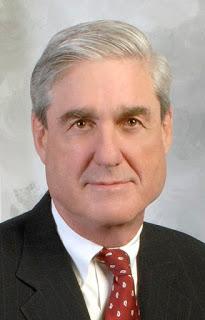 Robert Mueller is an American HERO. He has served the United States for most of his adult life. It started when he served in the Marines in Vietnam (winning a Bronze Star and a Purple Heart). Then he served in various positions in the Justice Department, and as Director of the FBI. He has been appointed to Senate-confirmed government positions by four presidents (George H.W. Bush, Bill Clinton, George W. Bush, and Barack Obama).
Robert Mueller is an American HERO. He has served the United States for most of his adult life. It started when he served in the Marines in Vietnam (winning a Bronze Star and a Purple Heart). Then he served in various positions in the Justice Department, and as Director of the FBI. He has been appointed to Senate-confirmed government positions by four presidents (George H.W. Bush, Bill Clinton, George W. Bush, and Barack Obama).Currently, he is serving as Special Counsel investigating collusion and other crimes committed by Donald Trump and his family, friends, and aides. I have no doubt that whatever conclusion he reaches in that investigation, it will be fair and totally truthful.
He has already gotten many indictments, and convictions of people close to Trump (his attorney, his NSA advisor, his campaign manager, etc.). And evidently Trump is scared of the investigation, because he (and his followers) have relentlessly attacked Mueller. They are not alone though.
Russia used social media (and groups like the NRA to funnel money) to help get Trump elected in 2016. Now, in an effort to protect their investment, Russia has continued to use social media -- this time to produce many attacks on and lies about Robert Mueller. Here is just part of a Washington Post article on this Russian disinformation campaign:
Months after President Trump took office, Russia’s disinformation teams trained their sights on a new target: special counsel Robert S. Mueller III. Having worked to help get Trump into the White House, they now worked to neutralize the biggest threat to his staying there. The Russian operatives unloaded on Mueller through fake accounts on Facebook, Twitter and beyond, falsely claiming that the former FBI director was corrupt and that the allegations of Russian interference in the 2016 election were crackpot conspiracies. One post on Instagram — which emerged as an especially potent weapon in the Russian social media arsenal — claimed that Mueller had worked in the past with “radical Islamic groups.” Such tactics exemplified how Russian teams ranged nimbly across social media platforms in a shrewd online influence operation aimed squarely at American voters. The effort started earlier than commonly understood and lasted longer while relying on the strengths of different sites to manipulate distinct slices of the electorate, according to a pair of comprehensive new reports prepared for the Senate Intelligence Committee and released Monday. . . . The emergence of Mueller as a significant target also highlights the adaptability of the Russian campaign. He was appointed in May 2017 as special counsel to investigate allegations of Russian influence on the Trump campaign. In that role, he has indicted on criminal charges a Kremlin-linked troll farm called the Internet Research Agency and others affiliated with the disinformation campaign. A Clemson University research team, not affiliated with either of the reports released Monday, found that the Russians tweeted about Mueller more than 5,000 times, including retweets first posted by others. Some called for his firing, while others mocked him as incompetent and still others campaigned for the end of his “entire fake investigation.” The report by New Knowledge highlighted the focus on Mueller and fired FBI director James B. Comey, who was falsely portrayed as “a dirty cop.”

